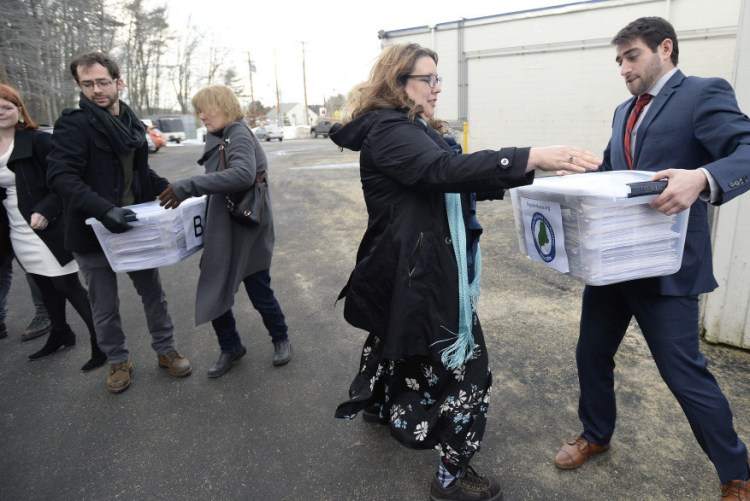AUGUSTA –– An effort to legalize recreational use of marijuana in Maine did not qualify for the November ballot, according to the Secretary of State’s Office.
Secretary of State Matt Dunlap said in a statement Wednesday that the proposal did not have enough valid signatures of Maine voters. The campaign needed 61,123 signatures, but according to Dunlap’s office, the campaign only provided 51,543 valid signatures.
The Campaign to Regulate Marijuana Like Alcohol, which led the effort to get the question on the ballot, now has 10 days to appeal the decision to Maine Superior Court.
Campaign leader David Boyer said proponents were “very disappointed” with the Secretary of State office’s determination that 17,000 signatures were invalid because the signature of a single notary who reviewed the petitions did not match the signature of the notary the state had on file.
“We will be exploring all legal avenues that are available to appeal this decision and sincerely hope that more than 17,000 Maine citizens will not be disenfranchised because of a handwriting technicality,” Boyer said.
The campaign turned in 99,229 signatures on Feb. 1.
According to Dunlap’s office, over 31,000 signatures were deemed invalid because signatures on petitions swearing that the circulator witnessed the signature collection did not match his or her signature on file. One circulator was listed as the public notary on 5,099 petitions containing 26,779 signatures.
Other irregularities included 13,525 signatures that were invalid because they did not belong to a registered voter in the municipality where they were submitted.
The Campaign to Regulate Marijuana Like Alcohol backed the initiative, which would allow adults 21 and older to possess small amounts of marijuana for recreational use.
The push for legalization began with two competing measures, including one backed by a group called Legalize Maine. But the campaigns united behind one proposal in October, after advocates became concerned that having two similar proposals on the ballot would create confusion among voters and split the vote.
The campaign faced opposition from a group formed to prevent legalization, and from parts of the medical marijuana community in Maine. When campaign supporters delivered petitions to the Secretary of State’s Office in Augusta in February, they were met by protesters who said that local medical marijuana growers and patients could be hurt if the referendum passed.
If Maine were to legalize recreational marijuana, it would join a small number of Western states that allow adults to buy and possess the drug. Colorado, Washington, Oregon, Alaska and Washington, D.C., have passed laws legalizing recreational marijuana despite a federal prohibition. Legalization referendums are expected to be considered this year in Nevada, California, Arizona, Michigan, Massachusetts and Vermont.
Maine has allowed medical marijuana since 1999 and the program has become increasingly popular in recent years. Last year, Mainers spent $23.6 million on medical marijuana from the state’s eight dispensaries, a 46 percent jump from the previous year. Those numbers don’t include sales to patients from the more than 2,200 caregivers licensed to grow and sell marijuana to patients.
The state cannot provide an exact number of patients because it does not keep a registry, but doctors have printed more than 35,000 certificates required under state regulations to certify patients. That number could include duplicates and replacement certificates and is likely higher than the actual number of patients, according to the Department of Health and Human Services, which oversees the medical marijuana program.
The legalization bill would have allowed adults to possess up to 2 1/2 ounces of marijuana and to cultivate a limited number of plants. Retail stores and social clubs would be allowed with municipal approval. Adults would be prohibited from using marijuana in public, with violations punishable by a $100 fine. The bill also places a sales tax of 10 percent on retail marijuana and marijuana products.
Staff writer Gillian Graham contributed to this report.
Staff Writer Steve Mistler can be contacted at 620-7016 or at:
Twitter: @stevemistler
Send questions/comments to the editors.


